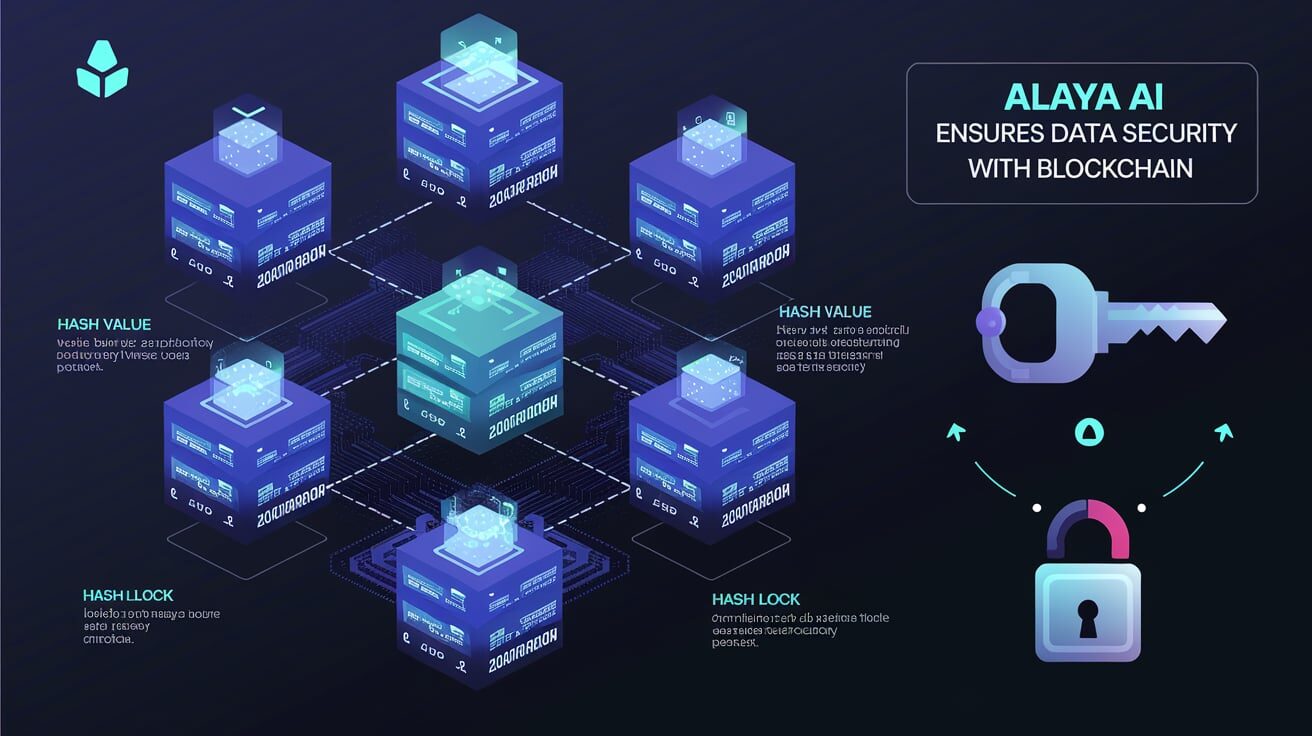In the last five years, more than 80% of businesses have had a data hack. Did you know that? Because AI systems handle vast amounts of sensitive information, complete data security has become imperative. Hackers target centralized databases with the intent to abuse them by gaining unapproved access, changing the data, and violating privacy.
In this article, I will analyze how Alaya AI enhances the security of Artificial Intelligence with blockchain-based management. Adopting a decentralized AI data platform removes single points of failure and locks processes with cryptographic keys and smart contracts guaranteeing secured data transactions. We will dive deep into how Web3 AI infrastructure, AI data crowdsourcing, and swarm intelligence in AI make a contribution to an impenetrable security framework.
Furthermore, we’ll examine a real-world case study demonstrating how Alaya AI protects AI model schooling datasets. Let’s uncover how Alaya AI is revolutionizing AI safety with blockchain technology.
How Alaya AI Uses Blockchain to Secure Data
1. Immutable Data Storage
The most prominent advantage of blockchain-based technology is the impossibility of erasing or altering any modification made to the system. Since Alaya AI stores datasets on a decentralized ledger, there is zero opportunity for any malicious actor to modify, delete, or manipulate the data.
- Every transaction is saved in a stable ledger that is untouchable.
- Once data passes through the consensus mechanism, it becomes impossible to change.
- Centralized data security breaches are no longer a threat.
Example: Alaya AI stores model training datasets on the ledger, and those records are guaranteed to stay untampered with.
2. Decentralized AI Data Platform for Enhanced Security
Due to their centralized nature, traditional AI models can easily be targeted by hackers.
Alaya AI’s Open AIs data platform alleviates this threat as the data is fragmented across multiple nodes.
- Safety and security for these data transfers are ensured by a peer-to-peer network.
- Unauthorized access by malicious users and online attacks are blocked.
For example: Swarm intelligence in AI makes it validate smart contracts, it can self-secure its processes, a phenomenon known as protecting AI process.
3. AI Data Crowdsourcing with End-to-End Encryption
To improve AI model accuracy, AI data crowdsourcing is often used. However, sharing data comes with privacy dangers. Alaya AI encrypts datasets using blockchain’s cryptographic protocols, ensuring data privacy in AI programs.
- Only verified contributors can access specific datasets.
- Smart contracts regulate who can use or modify the data.
- Reduces exposure to data leaks.
Case Study
Even though there were concerns related to patient data protection, a multinational technology company trained a model using an AI diagnostic. Alaya AI put in place a blockchain framework that allowed for encryption that kept patient records accessible only to properly vetted legal entities.
The data were inaccessible to any user who had not been granted permission by the system. This was how the confidential information was protected, while also meeting and managing all legal requirements surrounding health data privacy.
The Role of Tokenized AI Models in Secure AI Development
4. Tokenized AI Models for Access Control
With blockchain, Alaya AI introduces tokenized AI models, permitting corporations to buy access to AI services securely.
- Tokens act as virtual keys, granting get right of entry to be based totally on predefined policies.
- Prevents unauthorized AI usage.
- Encourages community-driven AI development through transparent incentives.
Example: AI developers can securely promote models to get entry without sharing raw information.
5. Gamification in Data Labeling to Prevent Fraud
Manipulating of data information is a problem during AI training. Alaya AI offers gamification in information labeling which guarantees statistics provided are of the highest quality. One of the most common problems in AI training is information manipulation.
- Contributors are rewarded for precise labeling of data.
- Fraudulent behavior gets punished through blockchain verification.
- Maintains records satisfactory for AI model training datasets.
An example would be, a dataset that has been wrongly labeled can be reported using numerous validators guaranteeing that AI data quality assurance is available. Penalties are applied for improper conduct thanks to blockchain authentication.
How Secure Data Transactions Protect AI Ecosystems
6. Smart Contracts for Secure AI Data Marketplace
The AI data marketplace driven by Alaya AI functions through smart contracts to execute secure automated transactions between users. Through blockchain technology, the system creates a new efficient data marketplace that eliminates intermediaries to provide transparency between sellers and buyers.
- Data buyers and sellers interact immediately, casting off the want for middlemen and reducing costs.
- Payments are only processed when predefined conditions are met, ensuring fairness and protection.
- Reduces risks associated with fraud and unauthorized access protecting valuable AI datasets.
- Enhances data authenticity by verifying that all AI schooling facts are ethically sourced and tamper-loose.
- Ensures transparency in transactions, permitting AI developers to trust the nice of their information.
Example:
An educational organization was looking for interesting information about education but started to worry about the authenticity of the information. Alaya AI’s blockchain-based solution guaranteed that the source’s dataset was verified, thus ensuring the information came from credible sources and could not be altered. The company successfully implemented an AI model using reliable training datasets with an accuracy guarantee of 30 times.
7. Compliance and Regulatory Benefits of Blockchain in AI Security
Security of data is not only reliant on technology but also on sensitive policies. Alaya AI provides compliance support for vital policies such as GDRP and CCPA, helping businesses achieve legal and ethical compliance.
- The use of blockchain technology guarantees transparency and responsibility through the provision of an audit trail for all data transactions.
- Alaya AI reduces the exposure of a business to legal challenges that may arise from the use of AI based applications.
- Alaya AI helps maintain the assurance of data quality in AI systems by guaranteeing proven records and reliability.
For instance, companies leveraging Alaya AI can demonstrate compliance by not only mitigating risks, but also with secure data transactions stored on the blockchain, ensuring adherence to regulations.
Conclusion
AI safety is no longer optional—it’s a need. As AI systems evolve, so do the threats focused on them. Traditional security measures fail to offer the level of safety wanted for AI programs handling with sensitive data. Alaya AI is setting a new industry trendy through leveraging blockchain-based totally information control, Web3 AI infrastructure, and secure data transactions to make sure uncompromised data safety.
By integrating swarm intelligence in AI, community-driven development, and tokenized AI models, Alaya AI safeguards AI ecosystems from cyber threats. Organizations benefit from superior data privacy in AI, ensuring their models operate with integrity and transparency. Whether you are an enterprise, researcher, or developer, adopting blockchain-sponsored safety features is critical in nowadays’s virtual landscape.
If you want to steady your AI information with blockchain technology, now is the time to explore Alaya AI. Protect your data and build a more secure AI future today!































